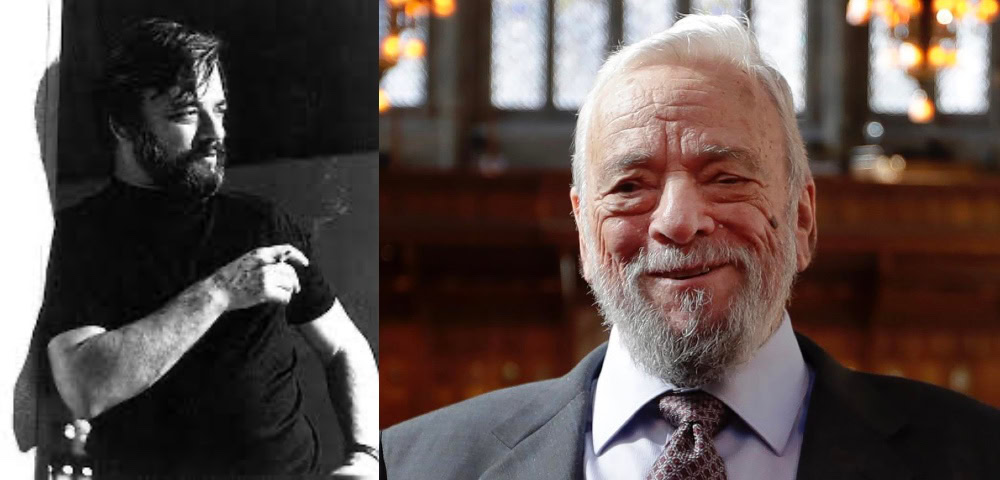
Stephen Sondheim, ‘Shakespeare Of Musical Theatre’, Passes Away

Stephen Sondheim, the iconic lyricist and composer of some of the most legendary shows in the history of musical theatre, died Friday at his home in Roxbury Connecticut.
Sondheim was 91 years old.
The New York Times called Sondheim the “greatest and perhaps best-known artist in American musical theatre,” while The Guardian in 2010 had asked the rhetorical question, “Is Stephen Sondheim the Shakespeare of musical theatre?”
Sondheim is renowned for his work as the lyricist for West Side Story (1957) and Gypsy (1959), as well as his work as a composer/lyricist for Company (1970), Follies (1971), A Little Night Music (1973), Sweeney Todd (1979), Into the Woods (1986), Sunday in the Park with George (1984), and Assassins (1990).
In total, Sondheim wrote the music and lyrics for 16 musicals and the lyrics for three others, and is considered to be one of the greatest lyricists and composers in musical theatre history.
‘Theatre Has Lost One Of Its Greatest Geniuses’
He left us with so many words, but none enough for this post. Goodbye, old pal. Thank you, Stephen Sondheim, for so much brilliance in the theatre and sharing your music with us all. pic.twitter.com/Qe55GcDQeS
— The Tony Awards (@TheTonyAwards) November 27, 2021
“The theatre has lost one of its greatest geniuses and the world has lost one of its greatest and most original writers,” said producer Cameron Mackintosh. “Sadly, there is now a giant in the sky. But the brilliance of Stephen Sondheim will still be here as his legendary songs and shows will be performed for evermore.”
New York Mayor Bill de Blasio tweeted, “Stephen Sondheim created fantastic worlds and characters, but at the heart of every story he told was a kid from New York City. And that kid was a legend. One of the brightest lights of Broadway is dark tonight. May he rest in peace.”
For his work, Sondheim accumulated a monumental list of awards including nine Tony Awards, five Olivier Awards, one Academy Award, a Pulitzer Prize and eight Grammy Awards. In 2015, Sondheim was awarded the Presidential Medal of Freedom.
Every so often someone comes along that fundamentally shifts an entire art form. Stephen Sondheim was one of those. As millions mourn his passing I also want to express my gratitude for all he has given to me and so many more. Sending my love to his nearest and dearest. pic.twitter.com/4KlnJJJipq
— Hugh Jackman (@RealHughJackman) November 26, 2021
“Stephen’s music is so beautiful, his lyrics so precise, that even as he exposes the imperfections of everyday life, he transcends them. We transcend them. Put simply, Stephen reinvented the American musical,” said former President Barack Obama at the Presidential Medal of Freedom ceremony in 2015.
Thank You For The Music
"I'll always be there / As frightened as you / To help us survive / Being alive." Goodnight to the renowned and truly matchless composer and lyricist Stephen Sondheim, who forever changed the landscape of American theater. ❤️ pic.twitter.com/Njv0ZekdEU
— Criterion Collection (@Criterion) November 26, 2021
Many of Sondheim’s songs are musical theatre canon including Send in the Clowns (A Little Night Music), Somewhere (West Side Story), Not A Day Goes By (Merrily We Roll Along), The Ladies Who Lunch (Company), and I’m Still Here (Follies).
“He gave me so much to sing about. I loved him dearly and will miss him so much. Thank you for all the gifts you gave the world Steve,” said Bernadette Peters, who was a long time friend and worked with Sondheim frequently.
“Everyone’s influenced by him, even if they claim they’re not,” said Lin Manuel Miranda. Barbra Streisand said Sondheim “always finds original ways to say things. Yet every word, every note, feels inevitable. He captures the truth in the most poetic way.”
Pacific Overtures with the great master himself. What an honor it was to perform your work. RIP Stephen Sondheim. pic.twitter.com/5MI2Y1JBLM
— George Takei (@GeorgeTakei) November 27, 2021
“For many theatre-lovers, there are musicals, then there are Sondheim musicals. The latter is a category of its own because with Sondheim, every single word, every rhyme has been laboured over to the point that it’s mellifluous and articulate (if a little garrulous),” wrote Gary Nunn in The Guardian.
‘I Wanted My Name In Lights’
Just a few months ago the legend Stephen Sondheim joined us in person for an unforgettable conversation. Rest in peace. pic.twitter.com/qyhdjz9TX6
— The Late Show (@colbertlateshow) November 26, 2021
Born in 1930 in New York, into an affluent family, Sondheim said, “My parents weren’t around much, but I assumed everybody’s family was the same. I didn’t know people had mummies and daddies who would give them milk and cookies after school. I just thought everybody lived on Central Park West and they had a nanny to take care of them.”
Sondheim saw his first Broadway musical, Very Warm for May, when he was nine years old, which was a revelation for the youngster. “The curtain went up and revealed a piano. A butler took a duster and brushed it up, tinkling the keys. I thought that was thrilling,” Sondheim said of the experience.
“I certainly wanted my name in lights. I wanted my name on a marquee. I wanted recognition on Broadway,” Sondheim said; a wish which he fully realised.
When Sondheim was 12 years old, he met, Oscar Hammerstein II, the father of his friend Jamie. “By Christmas, Stephen was more a Hammerstein than a Sondheim,” Jamie Hammerstein said years later.
A Long Mentorship
Sondheim, who had a famously fractious relationship with his parents, blossomed under the tutelage of Oscar Hammerstein II. “Oscar Hammerstein was a surrogate father during all those many days, and weeks and months when I didn’t see my own father,” Sondheim said.
The mentorship served as a training ground for Sondheim. “The whole point is to underwrite not overwrite because music is so rich an art itself,” Hammerstein instructed Sondheim.
“He taught me how to structure a song, what a character was, what a scene was; he taught me how to tell a story, how not to tell a story, how to make stage directions practical,” Sondheim told Paris Review in 1997.
Despite the long-mentorship Sondheim was critical of Hammerstein’s work. “Oscar’s lyrics are often flat-out sentimental, lacking in irony, which is the favourite mode of expression of the latter part of the 20th century. And I happen to love irony. He had a limited range of imagery — too many birds in his lyrics — stuff that is metaphorically what we all feel, but because they’ve been overused so much, and often by him, they lack force.”
“By the time I was 22, I was a professional. A young and flawed professional, but not an amateur,” Sondheim said.
West Side Story
Bereft yet beyond grateful.
You always gave us the words:
“Your love will live in me.”
Thank you for ALL you gave us dear Steve.
💖💖🌟💫💞✨✨✨✨
🙏🙌💗 #StephenSondheim pic.twitter.com/m0cjg2Xui5— Donna Murphy (@DMurphyOfficial) November 27, 2021
Sondheim cemented his legendary status when, at 27 years of age, he wrote the lyrics to West Side Story, which first opened on Broadway in 1957 and ran for more than 700 performances. Sondheim was never happy with his work on West Side Story and referred to his lyrics as “embarrassing.”
“It’s very hard for me to listen to some of those songs,” he said. In particular, Sondheim disliked Maria’s line “It’s alarming how charming I feel.”
“I don’t know what a Puerto Rican street girl is doing singing a line like that,” Sondheim said.
Sondheim’s first work as both lyricist and composer was A Funny Thing Happened on the Way to the Forum (1962), which won the Tony for Best Musical.
In a 2013 interview with NPR, Sondheim said, ”I love the theatre as much as music, and the whole idea of getting across to an audience and making them laugh, making them cry — just making them feel — is paramount to me.”
I’m Still Here
What would we do without you? Thanks for being alive, Stephen Sondheim.
— Letterboxd (@letterboxd) November 26, 2021
In his book Finishing the Hat, Sondheim wrote, “If you think of a theatre lyric as a short story, as I do, then every line has the weight of a paragraph.”
For LGBTQI audiences, it’s Sondheim’s lyrics to I’m Still Here which are perhaps most instantly recognisable.“First, you’re another sloe-eyed vamp / Then someone’s mother / Then you’re camp / Then you career from career to career. Plush velvet sometimes / Sometimes just pretzels and beer – but I’m here.”
In 2010, when the Henry Miller’s Theatre on Broadway was renamed in his honour, Sondheim said, ”I’m deeply embarrassed, I’m thrilled but deeply embarrassed…partly because I’ve always hated my last name.”
His acerbic nature often showed up in Sondheim’s interviews. ”You have two kinds of shows on Broadway — revivals and the same kind of musicals over and over again, all spectacles,” Sondheim told Frank Rich of the New York Times in 2000.
“You get your tickets for The Lion King a year in advance, and essentially a family comes as if to a picnic, and they pass on to their children the idea that that’s what the theatre is — a spectacular musical you see once a year, a stage version of a movie. It has nothing to do with theatre at all. It has to do with seeing what is familiar. We live in a recycled culture.”
‘Leave Me Alone, Just Let Me Ride’
Sondheim, who was famously reticent, once said, “The outsider feeling— somebody whom people want to both kiss and kill—occurred quite early in my life.”
When Bernadette Peters called Sondheim “a walking, living icon,” he replied “It’s really nice, but it’s also embarrassing. My tendency, my desire is ‘leave me alone, just let me ride.’”
Sondheim, who came out publicly when he was 40, is survived by his husband, Jeffrey Scott Romley, who is 50 years his junior. The couple married in 2017 and had split their time between homes in Manhattan and Connecticut.








